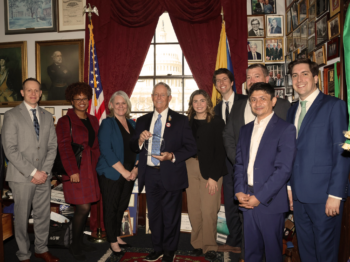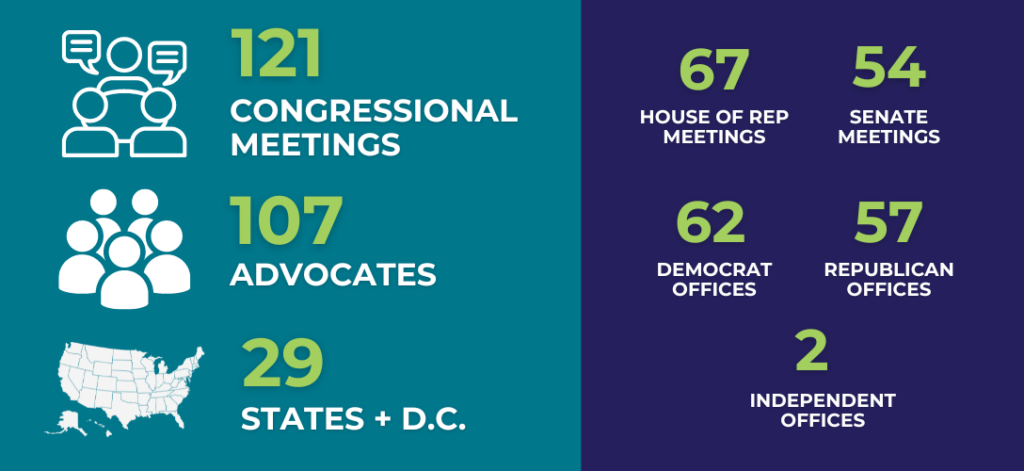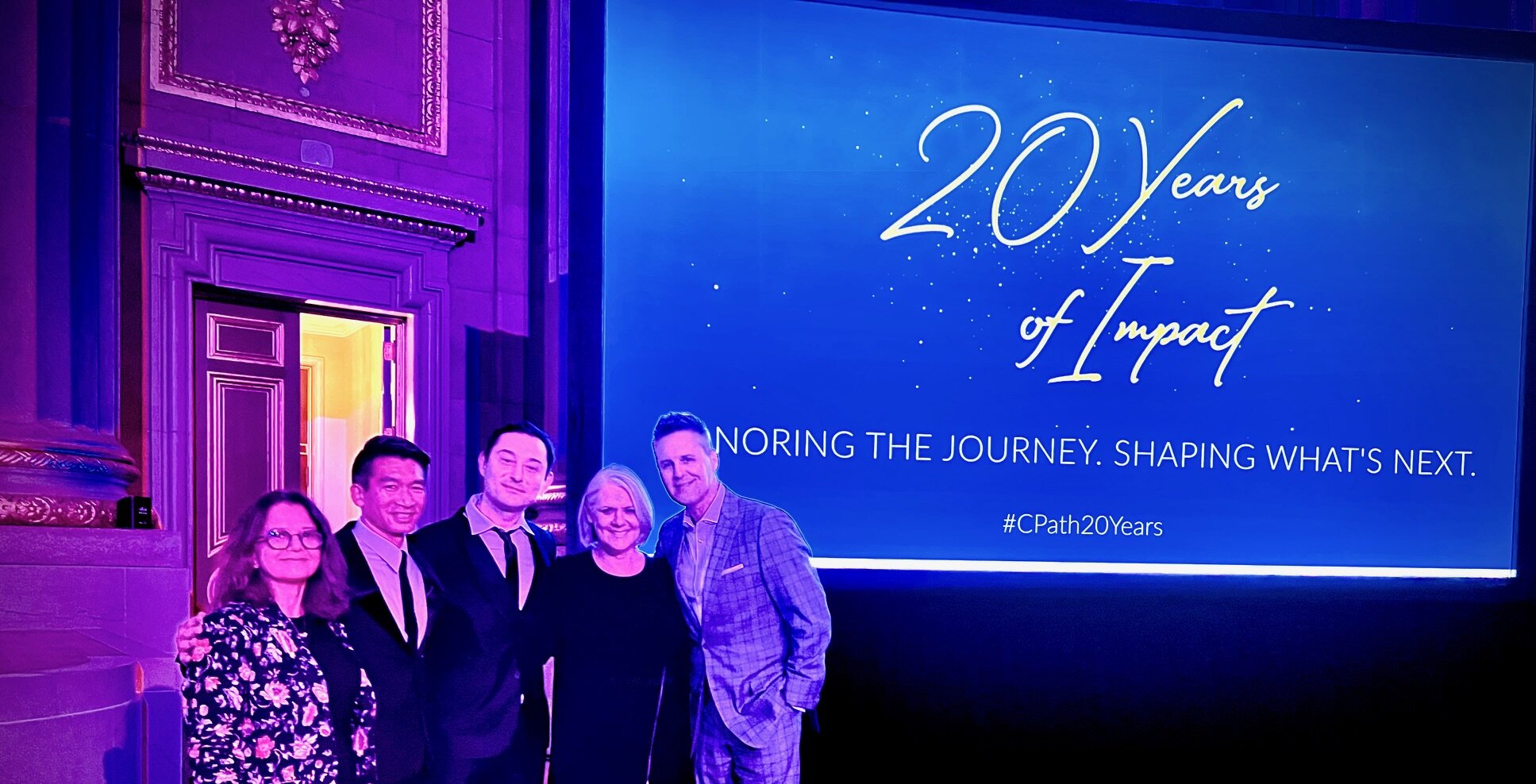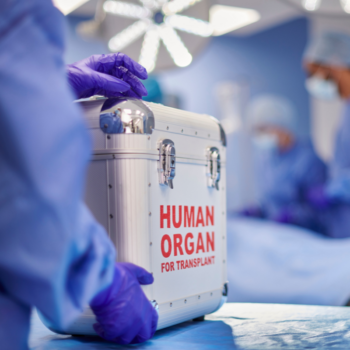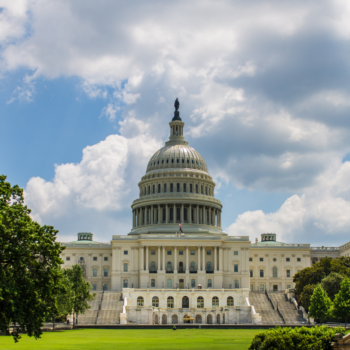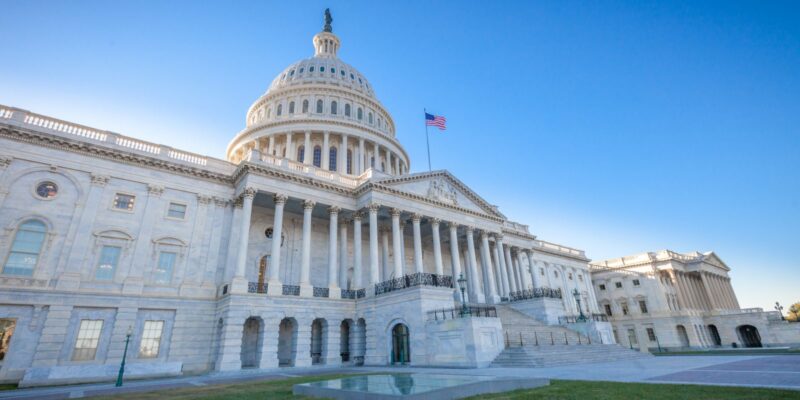Published on May 8, 2024 | This spring, the PKD Foundation and local advocates brought the needs of the polycystic kidney disease (PKD) community to Capitol Hill. Through two events, these passionate advocates elevated PKD-centric policies to Congress and called for vital research funding to improve the lives of people with PKD.
National Kidney Month Hill Day
Determined to power change during National Kidney Month, PKD Foundation executive leadership went to Washington D.C. on March 20.
PKD Foundation President and CEO Susan Bushnell was joined by Vishal Patel, M.D., the Foundation’s Scientific Advisory Panel chair, and Advocacy Champions Gregory Mainolfi and Sean Piccirilli. Together, they advocated for policies to advance PKD research, treatment, and care across 13 congressional meetings.

“This National Kidney Month, the Foundation wanted to meet directly with lawmakers in the nation’s capital to discuss how they can support the estimated 600,000 families affected by PKD. The discussions revealed a bipartisan resolve to meet PKD patient needs through dedicated research funding and legislative measures to facilitate lifesaving transplants and enhance PKD care.”
—Susan Bushnell, PKD Foundation President and CEO
Virtual Advocacy Day
On April 9, we had our largest Virtual Advocacy Day yet. This year, 107 PKD advocates, representing 29 states and Washington D.C., participated in 121 meetings. Compared to 2023, participation increased by 15 advocates and 11 meetings. Thanks to the commitment of the PKD Foundation community.
Because of PKD Foundation advocates, Representative Shri Thanedar is now a co-sponsor of the Living Donor Protection Act and Representative Eleanor Holmes Norton is cosponsoring the Living Organ Donor Tax Credit Act. Thank you to the PKD Foundation community for your commitment to creating change.

“Meeting with Congress and their staff on Virtual Advocacy Day has been educational, empowering, and moving as they listen to the priorities that are so important and our stories about PKD life. They will remember us because of our Advocacy Champions stories and the strength we have in the face of polycystic kidney disease.”
—Jeannie Brown, PKD Foundation Advocacy Champion
What topics did we discuss during these PKD advocacy days?
Both Hill Day and Virtual Advocacy Day 2024 focused on three topics: research funding, the Living Donor Protection Act, and the Living Organ Donor Tax Credit Act.
Congressionally Directed Medical Research Program (CDMRP), Peer Reviewed Medical Research Program (PRMRP)
The CDMRP, PRMRP is one of the PKD Foundation’s top policy priorities. In total, the program provides $370 million in funding for a select list of disease topics. Every year, the Foundation submits over 40 appropriations requests to ensure PKD remains on the list of designated topics. Because of our advocacy efforts, PKD researchers are eligible to compete for the $370 million in available federal funding.
Living Donor Protection Act (S.1384/H.R.2923)
Living donors show an incredible act of humanity in giving a part of themselves to another. This is also critical to PKD patients who experience improved outcomes when receiving a kidney from a living donor rather than a deceased donor. With a transplant, patients typically no longer face the burdensome requirements of dialysis, nor its potential complications.
To support living donors, the Living Donor Protection Act would prohibit insurance companies from denying or limiting life, disability, or long-term care insurance and from charging higher premiums to living donors. Additionally, it would ensure that living organ donors can use time granted through the Family Medical Leave Act (FMLA) to recover from donation. Transplant surgery is a major operation and comes with risks for complications just like any other. Both donors and recipients need time to recoup after surgery.
Living Organ Donor Tax Credit Act (H.R. 6171)
There are over 90,000 individuals on the kidney transplant waitlist. In the United States, most kidney transplants come from deceased kidney donors. In 2023, just 6,290 kidneys were transplanted from living donors.
How will the Living Organ Donor Tax Credit Act help? In order to remove financial barriers for prospective organ donors, the act provides a $5,000 refundable tax credit to cover costs associated with living organ donation. For example, travel, lodging, medical fees, etc.
By helping eliminate financial barriers that could deter potential living donors, this legislation can save lives.
Interested in advocacy?
Though Mini Day and Virtual Advocacy Day are over, PKD advocacy never stops. Join the Advocacy Champions Network or sign up for Advocacy Alerts to further change year-round.
The PKD Foundation Virtual Advocacy Day 2024 is made possible by a grant from Otsuka Pharmaceutical, Inc.





